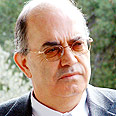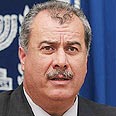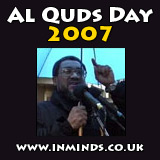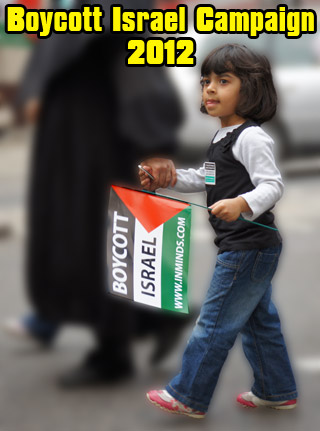
 Innovative Minds © 2014. All Rights Reserved. www.inminds.co.uk | ||||
|
Comment: Those Arabs who survived zionist ethnic cleansing in 1948 were forced to accept Israeli nationality. Today nearly 1 in 4 Israeli's is an Arab[1]. They are second class citizens in their own land. An Israeli poll[2] revealed that 62% of Israelis want their government to expel Arab citizens of Israel from Israel.. [1]The State Department's Annual Country Reports on Human Rights Practices for 2004 report states that the population of Israel stands at 6.8 million, of whom 5.2 million are Jews (ie 24% are not Jewish) Stop treating Arab citizens like enemiesRoee Nahmias 
Anyone expressing non-Jewish or non-Zionist opinions is considered a greater enemy. Even a Arab who does nothing, keeps quiet, accepts reality and tries to live his life, cannot live his life in equality.
Dr Adel Manna, Arab Israeli academic, head of the Department for Arab Society in Israel at the Van Leer Jerusalem Institute Israel's Arab sector publishes documents challenging State's Jewish character. Arab intellectuals, politicians explain why existing model must change, why 2007's Arab citizens can no longer keep silent "My dream is that my children and grandchildren, as well as Israel's Arab citizens, will be able to feel they are part of the country, that they have equal rights ⦠and that they are not treated like enemies," says leading Arab Israeli academic Dr Adel Manna. Manna, the head of the Department for Arab Society in Israel at the Van Leer Jerusalem Institute, is concerned by the widening gap between Israel's Jewish and Arab citizens. Last year the National Committee of the Heads of the Arab Local Authorities in Israel released a declaration (The Future Vision of the Palestinian Arabs in Israel) highlighting the aspirations of the Arab minority in Israel. The declaration reads: "We, the Palestinian Arabs living in Israel, the natives of the land and the citizens of the state, part of the Palestinian people and the Arab nation ⦠the 1948 war brought about the creation of the State of Israel on 78 percent of the territory of historical Palestine. We, who counted 160,000 in our homeland, found ourselves within the borders of the Jewish state, cut-off from the rest of our Palestinian people and the Arab world, were forced to accept the Israeli nationality and we became a minority in our historical homeland."
'Israel must recognize Palestinians' suffering'But the declaration did not just dwell on the region's history, going as far as outlining key demands by Israel's Arab minority. These include the recognition by Israel of the suffering inflicted upon the Palestinians in the aftermath of its creation in 1948. The declaration also stipulates that Israel should compensate its Arab citizens and cease to treat them like "enemies." It also demands that Israel allow its Arab minority to govern its own affairs and nurture its "natural ties" with the Palestinians and the Arab world. Another section demands that Israel drop its policy of advancing the interests of the Jewish majority to the detriment of the Arab minority and to fight discrimination in all sectors. Dr Mana said the Jewish public should not be alarmed by the Arab minority's demands to have equal rights. "Instead of understanding where this is coming from everybody stands up to defend the brainwashing of the Jewish public as if everybody who criticizes the policy of discrimination does not recognize the State of Israel," he said. "The Israeli public doesn't want to understand that it is demanding the Arabs become loyal but on the other hand it is not allowing them to do so ⦠What's wrong with demanding full partnership?" he added. A number of Arab Israeli organizations issued similar statements last year. The Mossawa and Adalah advocacy centers formulated an initiative called "An Egalitarian Constitution for All and a Democratic Constitution". 'Do demands threaten Jews' rights?'"Does Mossawa's document about an egalitarian constitution for all constitute a threat to the Jews' right for self-determination? This is absurd. Instead of holding discussions with us about the document we are receiving threats from the head of the Shin Bet," said Jafar Farah, director of the Mossawa Center. Dr. Elie Rekhess Director of Tel Aviv University's Konrad Adenauer Program for Jewish-Arab Cooperation, who has been studying the Arab society in Israel for years, explained how complicated the situation really is. "There is confusion and breakdown of systems in the Arab society and there is no clear direction," he said. "This is a transition period, and the confusion is expressed in the fact that there are several movements that donât come together in unity but clash in opposite directions. There is the Islamic movement, the national/nationalistic movement, the integrated movement and what I call the silent majority. "I feel that the silent majority is an amorphous group with much power. There is potential to create an integrated system that could be attractive for a great part of the Arab public in Israel, but the problem is that the national and Islamic aspects hover above like a threatening shadow and have the power to undermine this system and create and deep crevice in Jewish-Arab relations. If the Arab public was to unite, for example, around the demand to change the character of the State of Israel as a Jewish state, this would mean we have reached a new phase," Rekhess said. Should the Israeli public be concerned?
I would like the State of Israel to fix with its own hands some of the injustice that was caused to its internal refugees. If the refuges who are Israeli citizens were allowed to return to their villages, this would not cause a demographic change⦠Then the State could prove to the Palestinians and to itself that its goal is not to uproot (the Arabs).
MK Mohammad Barakeh "This is something that should concern the Israeli public at large. Unfortunately, the Arab issue is not on the national agenda, except on the level of criticismâ¦Nonetheless, the situation is not irreversible. It is a national mission to begin breaking the problem down to its components." It is therefore no wonder that when different figures from the Arab public are asked what their future dreams in Israel are, a sigh, followed by prolonged silence, is initially heard before an attempt to answer is made. "My dread is for my children and grandchildren, since I won't get to see it with my own eyes," said Dr Manna. "I would like there to be in Israel a different life than the one I lived, in the sense that they could feel that Israel was their country and not just the Jewish people's county," he added. "After all, it is for similar reasons that the Jewish people in Europe woke up and decided that they wanted a state. Individually, many of the Jews were living well, but many of them, beside anti-Semitism and discrimination, were not accepted as citizens because they were Jewish, and this is the Arabs' situation. Unfortunately, for the past 60 years the Jews have been treating the Arabs as they were treated for many years. "Of course, anyone expressing non-Jewish or non-Zionist opinions is considered a greater enemy. Even a Arab who does nothing, keeps quiet, accepts reality and tries to live his life, cannot live his life in equality. Various polls, including the Israel Democracy Institute's poll, revealed that 62 percent of the Jewish public expects the State to take action to encourage Arab migration from Israel, at the same time, over 90 percent expect the State to encourage Jewish immigration. "So how do you expect me to feel here? And this is what I would like to change. I would like the State to make peace with its own citizens first. If it can't make peace with its citizens, then how can it live in peace in the Middle East? "We are told that equality will come when the conflict ends, but this is nonsense and deceit⦠You can't keep lying to a public that goes to university and knows the internal Jewish dialogue." 'No perfect model between religions'Mossawa Director Jafar Farah said, "There is an illusion here, and the Jews should stop acting like they are in Europe. Israel wants to play Basketball in Europe and sing in the Eurovision. There are people that say 'I wouldn't want to send someone that looks like an Arab to the Eurovision.' What hostility toward the Arab space! What ghetto mentality! Where do you want to kick the Arabs out from? This tiny country? What security would that bring? Creating another 1.3 million refuges? My dream is that the Jews get out of this ghetto mentality and realize that the Middle East is a place in which we can live and develop." What then, do these men wish for? Where would they like to see themselves and their public in 59 years? Farah's vision is for "a normal country in which one can wake up in the morning, drive to different places, to Amman and to Ramallah, and to return to the family in Haifa by afternoon⦠I donât what the State to turn into a melting pot, but to respect the cultural diversity "I donât mind recognizing the Jews' need for self-determination, but I want the Jews to recognize my right to equality, to be a part of the Middle East and to be recognized as a native national minority whose place and future in this land is not disputed," he said. Hadash Chairman MK Mohammad Barakeh said, "My dream is that the historical slogan that I and my party support - two states for two peoples - is realized. It could have been achieved 60 years ago and I donât think we should wait another 60 years." "As for the more personal aspect, I would like the State of Israel to fix with its own hands some of the injustice that was caused to its internal refugees. If the refuges who are Israeli citizens were allowed to return to their villages, this would not cause a demographic change⦠Then the State could prove to the Palestinians and to itself that its goal is not to uproot (the Arabs)," he said. United Arab List-Ta'al Chairman MK Ibrahim Sarsur who is also a member of the Islamic Movement, gave his vision: "I am a religious man who believes that in this world one cannot reach what is called a perfect model between religions, but we can reach something close to that. "I expect that soon enough a completely independent Palestinian state will be established within the 1967 borders. If this state is established, the floodgates will burst, just as they did in Europe, and the Arab world will recognize Israeli's right to exist and normalize ties with it. Jews would be able to enjoy the status of full partnership, for the first time after 3,000 years of persecution. "The establishment of a Palestinian state would project a very positive light on Israel. It would help the Jews free themselves from the complex they have," he said. What about the State's symbols?"I submitted a bill to change the anthem, or at least to have would be two anthems, a national one and a civil one. The anthem's melody is beautiful, but it is impossible to identify with the words," MK Barakeh said. Source: http://www.ynetnews.com/articles/0,7340,L-3391545,00.html Also Of InterestPage URL: http://inminds.com/article.php?id=10090
|
|
Support Us
If you agree with our work then please support us.Campaigns INMINDS Facebook Live Feed Latest Video's
INMINDS Twitter Feed Tweets by @InmindsComFeatured Video's
You need Flash player 8+ and JavaScript enabled to view this video.
[all videos (over 200)..] Featured MP3 Podcast  "Al-Quds is not the responsibility of the Palestinian people only - they are only the guardians of Al-Quds - but we are the owners. Al-Quds belongs to the Muslims and it has to be defended by the Muslims wherever they are!" Muslim Council of Britain Al Quds Day 2006, London [5min / 2Mb] [all podcasts..] Newsletter Feedback |
 |
 |












































